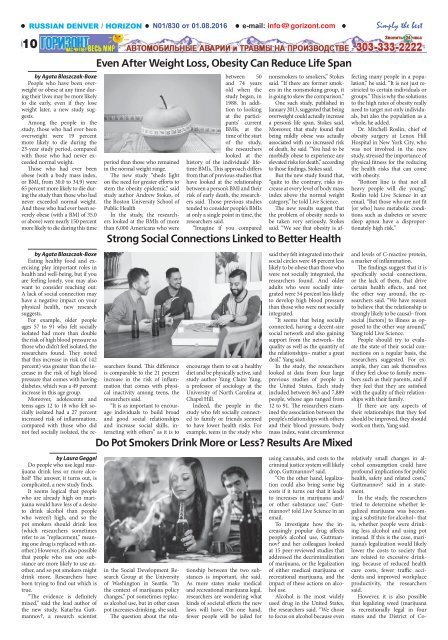Горизонт N1/830
Горизонт (газета) — (Gorizont англ. Horizon ) первая и наиболее влиятельная газета, издающаяся на русском языке в штатеКолорадо, США. Еженедельник, выходит по пятницам, формат Таблоид, 128 цветных и чернобелых страниц, распространяется в городах, составляющих метрополию Денвера (Большой Денвер), и в других населенных пунктах штата Колорадо от графства Саммит до графства Эль—Пасо. Полная электронная версия газеты «Горизонт» доступна в сети Интернет. Подробнее http://en.wikipedia.org/wiki/Gorizont_(newspaper)
Горизонт (газета) — (Gorizont англ. Horizon ) первая и наиболее влиятельная газета, издающаяся на русском языке в штатеКолорадо, США. Еженедельник, выходит по пятницам, формат Таблоид, 128 цветных и чернобелых страниц, распространяется в городах, составляющих метрополию Денвера (Большой Денвер), и в других населенных пунктах штата Колорадо от графства Саммит до графства Эль—Пасо. Полная электронная версия газеты «Горизонт» доступна в сети Интернет. Подробнее http://en.wikipedia.org/wiki/Gorizont_(newspaper)
Create successful ePaper yourself
Turn your PDF publications into a flip-book with our unique Google optimized e-Paper software.
RUSSIAN DENVER / HORIZON<br />
10<br />
by Agata Blaszczak-Boxe<br />
People who have been overweight<br />
or obese at any time during<br />
their lives may be more likely<br />
to die early, even if they lose<br />
weight later, a new study suggests.<br />
Among the people in the<br />
study, those who had ever been<br />
overweight were 19 percent<br />
more likely to die during the<br />
23-year study period, compared<br />
with those who had never exceeded<br />
normal weight.<br />
Those who had ever been<br />
obese (with a body mass index,<br />
or BMI, from 30.0 to 34.9) were<br />
65 percent more likely to die during<br />
the study than those who had<br />
never exceeded normal weight.<br />
And those who had ever been severely<br />
obese (with a BMI of 35.0<br />
or above) were nearly 150 percent<br />
more likely to die during this time<br />
Even After Weight Loss, Obesity Can Reduce Life Span<br />
period than those who remained<br />
in the normal weight range.<br />
The new study “sheds light<br />
on the need for greater efforts to<br />
stem the obesity epidemic,” said<br />
study author Andrew Stokes, of<br />
the Boston University School of<br />
Public Health<br />
In the study, the researchers<br />
looked at the BMIs of more<br />
than 6,000 Americans who were<br />
between 50<br />
and 74 years<br />
old when the<br />
study began, in<br />
1988. In addition<br />
to looking<br />
at the participants’<br />
current<br />
BMIs, at the<br />
time of the start<br />
of the study,<br />
the researchers<br />
looked at the<br />
history of the individuals’ lifetime<br />
BMIs. This approach differs<br />
from that of previous studies that<br />
have looked at the relationship<br />
between a person’s BMI and their<br />
risk of early death, the researchers<br />
said. Those previous studies<br />
tended to consider people’s BMIs<br />
at only a single point in time, the<br />
researchers said.<br />
“Imagine if you compared<br />
Strong Social Connections Linked to Better Health<br />
by Agata Blaszczak-Boxe<br />
Eating healthy food and exercising<br />
play important roles in<br />
health and well-being, but if you<br />
are feeling lonely, you may also<br />
want to consider reaching out:<br />
A lack of social connection may<br />
have a negative impact on your<br />
physical health, new research<br />
suggests.<br />
For example, older people<br />
ages 57 to 91 who felt socially<br />
isolated had more than double<br />
the risk of high blood pressure as<br />
those who didn’t feel isolated, the<br />
researchers found. They noted<br />
that this increase in risk (of 142<br />
percent) was greater than the increase<br />
in the risk of high blood<br />
pressure that comes with having<br />
diabetes, which was a 49 percent<br />
increase in this age group.<br />
Moreover, adolescents and<br />
teens ages 12 to 18 who felt socially<br />
isolated had a 27 percent<br />
increased risk of inflammation,<br />
compared with those who did<br />
not feel socially isolated, the researchers<br />
found. This difference<br />
is comparable to the 21 percent<br />
increase in the risk of inflammation<br />
that comes with physical<br />
inactivity among teens, the<br />
researchers said.<br />
“It is as important to encourage<br />
individuals to build broad<br />
and good social relationships<br />
and increase social skills, interacting<br />
with others” as it is to<br />
N01/<strong>830</strong> от 01.08.2016 e-mail: info@gorizont.com Simply the best<br />
encourage them to eat a healthy<br />
diet and be physically active, said<br />
study author Yang Claire Yang,<br />
a professor of sociology at the<br />
University of North Carolina at<br />
Chapel Hill.<br />
Indeed, the people in the<br />
study who felt socially connected<br />
to family or friends seemed<br />
to have lower health risks. For<br />
example, teens in the study who<br />
said they felt integrated into their<br />
social circles were 48 percent less<br />
likely to be obese than those who<br />
were not socially integrated, the<br />
researchers found. And older<br />
adults who were socially integrated<br />
were 54 percent less likely<br />
to develop high blood pressure<br />
than those who were not socially<br />
integrated.<br />
“It seems that being socially<br />
connected, having a decent-size<br />
social network and also gaining<br />
support from the network– the<br />
quality as well as the quantity of<br />
the relationships– matter a great<br />
deal,” Yang said.<br />
In the study, the researchers<br />
looked at data from four large<br />
previous studies of people in<br />
the United States. Each study<br />
included between 863 and 7,889<br />
people, whose ages ranged from<br />
12 to 91. The researchers examined<br />
the association between the<br />
people’s relationships with others<br />
and their blood pressure, body<br />
mass index, waist circumference<br />
Do Pot Smokers Drink More or Less? Results Are Mixed<br />
nonsmokers to smokers,” Stokes<br />
said. “If there are former smokers<br />
in the nonsmoking group, it<br />
is going to skew the comparison.”<br />
One such study, published in<br />
January 2013, suggested that being<br />
overweight could actually increase<br />
a person’s life span, Stokes said.<br />
Moreover, that study found that<br />
being mildly obese was actually<br />
associated with no increased risk<br />
of death, he said. “You had to be<br />
morbidly obese to experience any<br />
elevated risks for death,” according<br />
to those findings, Stokes said.<br />
But the new study found that,<br />
“quite to the contrary, risks increase<br />
at every level of body mass<br />
index above the normal weight<br />
category,” he told Live Science.<br />
The new results suggest that<br />
the problem of obesity needs to<br />
be taken very seriously, Stokes<br />
said. “We see that obesity is affecting<br />
many people in a population,”<br />
he said. “It is not just restricted<br />
to certain individuals or<br />
groups.” This is why the solutions<br />
to the high rates of obesity really<br />
need to target not only individuals,<br />
but also the population as a<br />
whole, he added.<br />
Dr. Mitchell Roslin, chief of<br />
obesity surgery at Lenox Hill<br />
Hospital in New York City, who<br />
was not involved in the new<br />
study, stressed the importance of<br />
physical fitness for the reducing<br />
the health risks that can come<br />
with obesity.<br />
“Bottom line is that not all<br />
heavy people will die young,”<br />
Roslin told Live Science in an<br />
email. “But those who are not fit<br />
[or who] have metabolic conditions<br />
such as diabetes or severe<br />
sleep apnea have a disproportionately<br />
high risk.”<br />
and levels of C-reactive protein,<br />
a marker of inflammation.<br />
The findings suggest that it is<br />
specifically social connections,<br />
or the lack of them, that drive<br />
certain health effects, and not<br />
the other way around, the researchers<br />
said. “We have reason<br />
to believe that the relationship is<br />
strongly likely to be causal– from<br />
social [factors] to illness as opposed<br />
to the other way around,”<br />
Yang told Live Science.<br />
People should try to evaluate<br />
the state of their social connections<br />
on a regular basis, the<br />
researchers suggested. For example,<br />
they can ask themselves<br />
if they feel close to family members<br />
such as their parents, and if<br />
they feel that they are satisfied<br />
with the quality of their relationships<br />
with their family.<br />
If there are any aspects of<br />
their relationships that they feel<br />
should be improved, they should<br />
work on them, Yang said.<br />
by Laura Geggel<br />
Do people who use legal marijuana<br />
drink less or more alcohol?<br />
The answer, it turns out, is<br />
complicated, a new study finds.<br />
It seems logical that people<br />
who are already high on marijuana<br />
would have less of a desire<br />
to drink alcohol than people<br />
who weren’t high, and so the<br />
pot smokers should drink less<br />
(which researchers sometimes<br />
refer to as “replacement,” meaning<br />
one drug is replaced with another.)<br />
However, it’s also possible<br />
that people who use one substance<br />
are more likely to use another,<br />
and so pot smokers might<br />
drink more. Researchers have<br />
been trying to find out which is<br />
true.<br />
“The evidence is definitely<br />
mixed,” said the lead author of<br />
the new study, Katar?na Guttmannov?,<br />
a research scientist<br />
in the Social Development Research<br />
Group at the University<br />
of Washington in Seattle. “In<br />
the context of marijuana policy<br />
changes,” pot sometimes replaces<br />
alcohol use, but in other cases<br />
pot increases drinking, she said.<br />
The question about the relationship<br />
between the two substances<br />
is important, she said.<br />
As more states make medical<br />
and recreational marijuana legal,<br />
researchers are wondering what<br />
kinds of societal effects the new<br />
laws will have. On one hand,<br />
fewer people will be jailed for<br />
using cannabis, and costs to the<br />
criminal justice system will likely<br />
drop, Guttmannov? said.<br />
“On the other hand, legalization<br />
could also bring some big<br />
costs if it turns out that it leads<br />
to increases in marijuana and/<br />
or other substance use,” Guttmannov?<br />
told Live Science in an<br />
email.<br />
To investigate how the increasingly<br />
popular drug affects<br />
people’s alcohol use, Guttmannov?<br />
and her colleagues looked<br />
at 15 peer-reviewed studies that<br />
addressed the decriminalization<br />
of marijuana, or the legalization<br />
of either medical marijuana or<br />
recreational marijuana, and the<br />
impact of these actions on alcohol<br />
use.<br />
Alcohol is the most widely<br />
used drug in the United States,<br />
the researchers said. “We chose<br />
to focus on alcohol because even<br />
relatively small changes in alcohol<br />
consumption could have<br />
profound implications for public<br />
health, safety and related costs,”<br />
Guttmannov? said in a statement.<br />
In the study, the researchers<br />
tried to determine whether legalized<br />
marijuana was becoming<br />
a substitute for alcohol– that<br />
is, whether people were drinking<br />
less alcohol and using pot<br />
instead. If this is the case, marijuana’s<br />
legalization would likely<br />
lower the costs to society that<br />
are related to excessive drinking,<br />
because of reduced health<br />
care costs, fewer traffic accidents<br />
and improved workplace<br />
productivity, the researchers<br />
said.<br />
However, it is also possible<br />
that legalizing weed (marijuana<br />
is recreationally legal in four<br />
states and the District of Co-

















